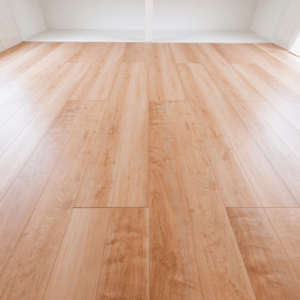Should you redo your floors?
Floors have a dramatic effect on your home’s decor. If you think about it, they’re some of the largest surfaces inside of your home – meaning they take up quite a lot of the space, visually. Your floors serve a functional purpose too, meaning they may have taken quite a beating over the years. Scuff marks and scratches will slowly start to eat away at the surface as time passes.
They can be a great place to focus your home upgrades, no matter if you’re looking to transform a room, or the whole level. But what will be the budget? What options do you have in terms of material and style, and what are the pros and cons of each? In this blog, we’ll cover maintenance options, as well as a few different ways you can redo your floors.
Hardwood
Hardwood floors are incredibly popular from both a functional and stylistic perspective.
Hardwood is often quite durable and low maintenance. It’s a long-lasting option that’s easy to clean, making it a great choice for any household – especially families with children who may cause a mess from time to time. It can also carry great resale value, seeing as it’s generally the most desired finish for buyers. This is compared to something like carpet or tile that may cost time and money to remove.
Hardwood is incredibly versatile in terms of style. The wide variety and different finishes available allow your hardwood floor to fit with almost any decor you would like. In future endeavors, it will allow you to change things up without having to make costly alterations to your floor in order to match. Be aware that not all hardwood floors are the same; some are solid wood and others are pre-engineered wood. Learn the difference prior to setting out on a project of refinishing because the process may be quite different.
Tile
Tile floors are generally found in the bathrooms and kitchens. This is because of their water resistance and durability. But this doesn’t mean you can’t put tile floors in the other spaces of your home. Tiles can come in a wide variety of shapes, sizes and styles, allowing you to match a room’s decor with a unique pattern or colour scheme that you feel suits it best. They’re generally very affordable, bearing in mind that it would also depend on quality and availability.
Like hardwood, this can boost your resale value, since they can generally be labeled as an “upgrade” due to their functional use. They’re also generally made from natural, eco-friendly materials, giving you some added peace of mind.
Concrete
Concrete floors are the ultimate candidate for low maintenance, durability and resistance. It’s a great option for open spaces, especially rooms with lots of running water like kitchens and bathrooms. Like tile, concrete floors can come in a wide variety of style and patterns, allowing you to take them in any direction you’d like.
Do keep in mind that concrete floors are prone to developing cracks with changing temperature, which is especially relevant in our diverse climate. They’re also incredibly hard, which may not be friendly to young children or seniors, or for standing upon for long periods of time.
Marble
Marble floors are incredibly stunning, there’s no doubt about that. They create a sense of luxury and elegance, perfect for large spaces. In terms of functionality, marble carries many of the same benefits and drawbacks as concrete – durable, but incredibly hard. Marble floors are also often very expensive, requiring a high or flexible budget.
Cork
If it fits your budget, cork flooring is chosen when searching for a comfortable flooring alternative, or for its hypoallergenic and eco-friendly characteristics; however achieving these will come at a cost. It is often more expensive that other flooring materials.
Carpet
Carpet floors are a great option for the communal living spaces of the home, like the living room. If you’re looking to create a soft surface or a cozy atmosphere, carpet can be a great choice. Carpeting can also be applied to stairs, which can be helpful as a sort of safety feature if you have any little ones or seniors around regularly.
Do bear in mind however that buyers are not currently keen on carpet floors. If you’re looking to sell, consider removing them and replacing them with something more versatile, like hardwood for example.
Any questions?
If you’re making upgrades to sell, don’t hesitate to reach out with any questions you may have.
